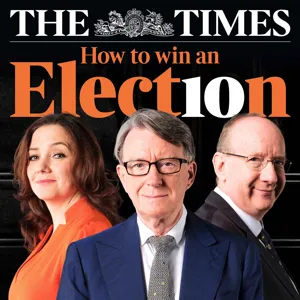Podcast Summary
Bombas' Social Responsibility and Rachel Rayner's Role in Labour Government: Bombas donates an item for every purchase, while Rachel Rayner has held multiple roles in the Labour Party despite tension with Keir Starmer, but faces frustration from supporters about her perceived exclusion. UnitedHealthcare's Health Protector Guard provides extra coverage for out-of-pocket medical costs with fewer requirements.
Bombas is a company that provides comfortably soft essentials for customers while also donating an item for every purchase to those experiencing homelessness. Rachel Rayner, a political figure in the UK, has been a subject of discussion regarding her potential role in a potential Labour government win. It has been suggested that she may be sidelined due to tensions with current Labour leader Keir Starmer. In the past, attempts have been made to change her roles within the party, resulting in her holding multiple positions including Shadow Cabinet Office Minister, Deputy Leader, and Shadow Secretary of State for the Future of Work. Despite this, there is frustration among her supporters about her perceived exclusion from the inner circle. On a separate note, UnitedHealthcare's Health Protector Guard fixed indemnity insurance plans offer extra coverage to help manage out-of-pocket medical costs without usual requirements and restrictions.
Angela Rayner's role in Labour Party: Deputy leader Rayner's unique appeal and effectiveness make it difficult for Keir Starmer to move her from her current powerful positions. Her influence and popularity ensure her continued tenure as shadow chancellor and cabinet office minister.
Angela Rayner's role in the Labour Party as the deputy leader, who was directly elected, makes it challenging for Keir Starmer to move her from her current position as the shadow chancellor of the duchy of Lancaster and the cabinet office minister, where she wields significant power. Rayner's unique appeal to certain voters and her effectiveness at the dispatch box make her an asset to the party, particularly during PMQs. Her comparison to John Prescott, who balanced the Labour ticket with Tony Blair, highlights the importance of having a diverse and dynamic team. Despite speculation about potential reshuffles, Rayner's influence and popularity within the party make it unlikely that she will be moved from her current role anytime soon. Additionally, her role in the future of work further strengthens her position within the party.
Angela Rayner's Role in the UK Government: Angela Rayner's role as Chancellor of the Duchy of Lancaster is a cross-government position requiring good relationships and handling unglamorous tasks, but some believe she'd be better in a more direct communication role promoting labor values.
Angela Rayner's role in the UK government, specifically as the Chancellor of the Duchy of Lancaster, has been a topic of debate due to its technical and cross-government nature. Some believe she would be better suited to a more direct communication role, where she can use her high public profile to promote labor values. The role of Chancellor of the Duchy of Lancaster is often described as a "mister fix it" or jack-of-all-trades position, requiring a good relationship with different parts of government and handling unglamorous tasks behind the scenes. However, there are also concerns that Rayner hasn't received enough credit for the achievements of the shadow cabinet office team during her tenure. Boris Johnson is set to be the focus of Freddie's upcoming questions. If you're a New Statesman subscriber, you can listen to all episodes ad-free on the New Statesman app. Stay tuned for more.
Boris Johnson's return to power as PM through House of Lords is unlikely: Historically rare, Boris Johnson's appointment to House of Lords and return as PM is unlikely due to political climate, strained relationships, and Labour's pledge to abolish it.
While it's technically possible for Boris Johnson to become prime minister again by being appointed to the House of Lords, it's highly unlikely given the current political climate and his own popularity. Historically, prime ministers have come from the House of Commons, with the last one from the Lords being over a century ago. Boris Johnson's appointment to the Lords would require the approval of one of his successors, who may not be inclined to do so due to their strained relationship with him. Additionally, the future of the House of Lords itself is uncertain, as Labour has pledged to abolish it. While Boris Johnson may entertain the idea of a return, it seems unlikely that he would have the necessary support or popularity to make it a reality.
Peers unlikely to become Conservative Party leaders or Prime Ministers: The House of Lords' constitutional differences and public perception make it highly unlikely for a peer to lead a major political party or serve as Prime Minister in the UK.
The current state of the Conservative Party and the political landscape in the UK makes it highly unlikely for a peer to become the leader of a major political party, let alone serve as Prime Minister. The House of Lords, where peers serve, is constitutionally different from the House of Commons, where Members of Parliament (MPs) are elected. The public may find it unacceptable for an appointed peer to lead a political party, especially given the history of tensions between the two houses. Moreover, peers in the House of Lords are often more independent-minded and rebellious, which could make leading a party from that power base challenging. The Conservative Party's recent struggles with leadership choices and the Labour Party's plans to fill the House of Lords with new peers further underscore the challenges of constitutional reform in the UK. Additionally, prime ministers are not required to be members of the House of Lords, making it even less likely for a lord to become a prime minister. The role of a peer, particularly in the context of the UK's political climate, is quite distinct from that of a political party leader or prime minister.
Disadvantages of Monarch as Political Leader, Challenges for Directly Elected Women: Monarchy comes with disadvantages, including potential for abuse of power. Directly elected women leaders may face challenges, leaving room for debate on best political system.
The idea of having a monarch or lord as a political leader may come with its own set of disadvantages, even if it sounds appealing at first. The panelists also touched upon the fact that a directly elected woman as a leader could face challenges, leaving a somewhat depressing note. If you have any questions, feel free to send them to newstatesman.com/forward/youaskus. Tune in on Monday for a new episode where we'll discuss which parties the national press might endorse at the next election. Don't forget to follow us on your podcast app and subscribe to our YouTube channel for new episodes. Apart from politics, here are some interesting facts: A crocodile cannot stick out its tongue, and Quinn's offers high-quality travel essentials at affordable prices. Additionally, UnitedHealthcare provides short-term health insurance plans for people between jobs or starting a side hustle, offering flexible and budget-friendly coverage with access to a nationwide network of doctors and hospitals.





